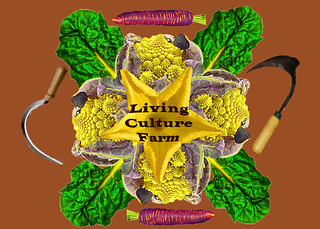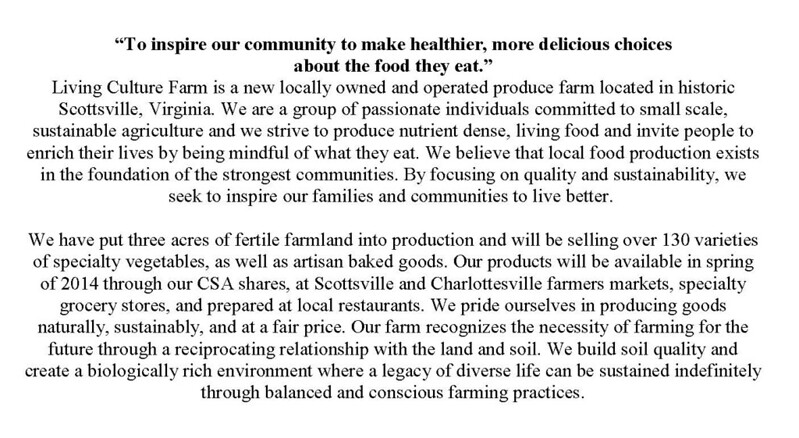Hello everyone!
Our website has moved to www.livingculturefarm.com
Please follow us there and on facebook while we update the market for winter/spring sales. Thanks!
Living Culture Farm Disease and Pest Management Policies
Living Culture Farm takes a firm stance against the use of harmful chemical pesticides and fertilizers on our vegetables, herbs, and fruits. We take a plant-positive approach to pest and disease management, meaning we rely on our plants’ exceptional vigor coupled with ideal growing conditions to combat negative environmental pressures. We have designed our farm to be a cornucopia of diversity, because it is through diversity that the natural world is resilient. In addition to our vast diversity of crops, we designate significant field space to beneficial herbs and flowers specifically designed to attract predatory insects and pollinators. We promote diversity and abundance of life in our soil by adding composted grass and manure, by using a six-year minimum crop rotation, and reducing compaction through low-till cultivation. We also use ducks and chickens as helpers for physically removing pests once a crop is finished.
Why is diversity so important?
Many of the disease and pest pressures that plague farmers come from a lack of diversity in their fields. Growing the same couple of crops year after year in the same place creates a consistent home for particular pests and diseases to flourish. Without the balancing effects of other insects and bacteria, farmers are forced to rely on chemical pesticides with increasing doses to keep the same harmful pests and diseases from damaging their crop. Living Culture Farm cultivates the naturally occurring diversity of life on our farm by growing a vast array of crops and varieties (over 130!) to keep the pests and diseases guessing. We also remove the chance of complete crop loss. This great variety also benefits our exploratory palettes!
What is crop rotation?
Crop rotation is an almost universally accepted growing practice for all types of farming. Crop rotation simply means not growing the same crop in the same place twice in a row. You might notice soybeans growing in a familiar farm field in the Fall, but see corn planted there in the Spring. Living Culture Farm separates crops by family, and makes sure not to grow the same family in the same place more than once every five years. Most crops are on a longer rotation. This gives the soil time to recharge nutrients used by a particular crop, and decreases the presence of pests and diseases.
Compost?
Compost has become synonymous with organic gardening in recent years. Compost is simply organic material that has been broken down (composted) into a mild, rich growing supplement by living organisms large and small, from earthworms to bacteria and fungi. Composting your own vegetable wastes and grass cuttings allows you to eliminate the need for buying fertilizer for your garden! Living Culture Farm uses composted manure, grass, and wood chips to add valuable organic material to our soil, as well as the beneficial bacteria and fungi that go along with it! These bacteria and fungi are the hardest workers on our farm, converting waste materials into life giving nutrients. They even team up with the roots of our vegetables to convert elements in the air into nutrients for our plants! We also steep compost into a “tea” for foliar spraying.

